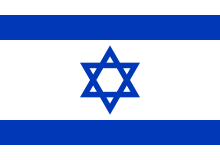Human rights in Israel
Human rights in Israel has been evaluated by intergovernmental organizations, non-governmental organizations (NGOs) and human rights activists. They are checked often in the context of the Israeli–Palestinian conflict, the wider Arab–Israeli conflict and Israel internal politics.

Politics
changeIsrael is a multiparty parliamentary democracy. It was described in its Declaration of Independence as a "Jewish state"[1] – the legal definition "Jewish and democratic state" was adopted in 1985.
Ethnicity
changeIn addition to its Jewish majority, Israel is home to religious and ethnic minorities. Some of them report discrimination. In the Palestinian territories, successive Israeli governments have been criticized from other countries and international human rights groups. One of the Basic Laws of Israel, aimed to make the basis of a future constitution,[2] Basic Law: Human Dignity and Liberty, is a major tool for safeguarding human rights and civil liberties in Israel.
LGBT rights
changeRights for sexual minorities in Israel are thought to be the best in the Middle East.
Marriage
changeIsrael has not legalized same-sex marriage. But same-sex marriages valid in foreign countries are legally recognized in Israel.[3][4] Israel guarantees civil rights for its homosexual population, including adoption rights and partner benefits.[5] Israel also gives a common-law marriage status for same-sex domestic partners. The sodomy law inherited from the British Mandate of Palestine was repealed in 1988. But there was an explicit instruction issued in 1953 by the Attorney General of Israel ordering the police to refrain from enforcing this law, so long as no other offenses were involved.
Anti-discrimination practices
changeA national gay rights law bans some anti-gay discrimination, including in employment; some exemptions are made for religious organizations. In the past, military service of homosexuals was subject to certain restrictions. These restrictions were lifted in 1993, allowing homosexuals to serve openly in all units of the army.[6]
Surgery
changeIn March 2014, the Ministry of Health stated that sex-reassignment surgery was included among subsidized health services provided to citizens. Despite this, in May Haaretz reported that a health maintenance organization refused to pay for two sex-change surgeries. This resulted in great expenses by the patients.
Employment
changeA national LGBTI task force found that 80 percent of transgender persons, 50 percent of lesbians and 20 percent of gay men were discriminated against when seeking employment.[7]
References
change- ↑ "The Avalon Project : Declaration of Israel's Independence 1948". Avalon.law.yale.edu. Retrieved 22 July 2010.
- ↑ Gavison, Ruth (1985). "The Controversy over Israel's Bill of Rights". Israel Yearbook of Human Rights. 15: 113–154.
- ↑ "Israel's Supreme Court approves same-sex marriages performed abroad". International Herald Tribune. 21 November 2006. Archived from the original on 25 February 2008. Retrieved 25 November 2006.
- ↑ "Israel recognizes same-sex marriages performed abroad". CNN. 21 November 2006. Retrieved 25 November 2006.[dead link]
- ↑ Walzer, Lee (21 February 2002). "Queer in the Land of Sodom". The Gully. Retrieved 1 August 2006.
- ↑ "Homosexual rights around the world". Gay Rights Info. Archived from the original on 10 December 2005. Retrieved 20 November 2011.
- ↑ Bureau of Democracy, Human Rights, and Labor (13 April 2016). "Israel and The Occupied Territories". Country Reports on Human Rights Practices – 2016. US Department of State. Retrieved 14 February 2017.
{{cite web}}: CS1 maint: multiple names: authors list (link)